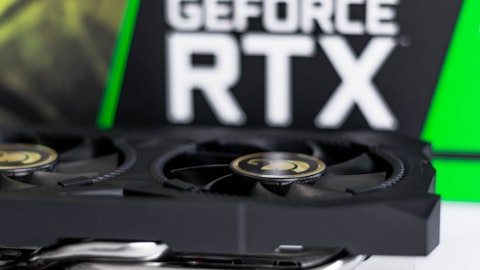We recently compiled a list of the 10 Best Beginner Stocks To Buy Now. In this article, we are going to take a look at where Alphabet Inc. (NASDAQ:GOOGL) stands against the other beginner stocks.
While investing in the stock market carries risk, the US stock market is generally considered a safe place to invest. It has a long history of growth and has consistently recovered from downturns, including major recessions and financial crises.
Over the last four to five years, the market has been hit by several unexpected downturns, due to a global pandemic and the Russia-Ukraine war, among other things, that crippled the global economy. However, the US broader market recovered swiftly and has been performing well since 2023. It is nearly 19% up year-to-date, as of August 23.
Nevertheless, it is still a complicated place for beginners and they should consider investing in shares of well-established companies with a history of stable performance and reliability. These stocks typically belong to large, financially sound companies that operate in diverse industries, such as technology, consumer goods, and healthcare.
Additionally, beginners can also look into index funds or exchange-traded funds (ETFs) that track major market indices like the S&P 500. These options offer diversification, which reduces the risk associated with investing in individual stocks while still providing exposure to the broader market’s potential gains. Investing in such well-established and diversified assets can help beginners build confidence and knowledge in the stock market. For such ETFs, you can check out our article on the best large-cap growth ETFs.
Opportunities and Caution for New Investors Due to Consumer Behaviour
On August 16, Melissa Minkow, director of retail strategy at CI&T, discussed the latest trends in U.S. consumer spending in a CNBC interview. Despite concerns about a potential recession, Minkow believes we might have avoided one. She pointed out that although consumers may feel like they are in a recession, their spending habits show otherwise. They continue to spend, especially when presented with discounts. Retailers have adapted by offering more targeted promotions this year, which has helped maintain consumer spending despite previous challenges like the pandemic and supply chain issues.
Minkow also noted that the effectiveness of promotions can vary across sectors. For example, quick-service restaurants like McDonald’s and Starbucks haven’t seen the same benefits from discounts as other retailers, partly because consumers may opt for more cost-effective alternatives like home-cooked meals. Additionally, brands that are already positioned as discount options might not see as much impact from promotions. However, retailers who offer significant discounts on desirable items can attract cost-conscious shoppers and increase sales volume, potentially offsetting the impact on profit margins.
For beginner investors in the stock market, the current retail sector dynamics offer both opportunities and challenges. The resilience of consumer spending, even in the face of economic uncertainty, suggests that certain sectors and companies could continue to perform well, especially those that effectively use promotions to drive sales. Retailers offering targeted discounts on popular items may attract more customers, boosting their sales volumes, which could lead to positive stock performance.
However, beginner investors should also be cautious. Not all companies benefit equally from promotions, as seen with the restaurant and food segment, where discounts haven’t significantly improved earnings. This highlights the importance of understanding the specific business models and market positioning of companies before investing.
The Market is Healthy but Caution is Advised
The U.S. stocks have seen a significant surge over the last few quarters, which are mainly driven by strong economic data and optimism about a potential soft landing for the U.S. economy. However, experts remain cautious as we discussed in our best defensive stocks article.
In the article, we discussed the J.P. Morgan report that noted the market’s heavy reliance on large, high-quality tech and AI companies, and it warned that maintaining this momentum could be challenging due to high valuations and potential market volatility. Here is an excerpt from the article:
“According to a July report by J.P Morgan, recent market trends have benefited large, high-quality companies, especially in tech and AI, which have resulted in high market concentration. However, maintaining this momentum in the second half of 2024 could be difficult due to high valuations and investor positioning. The report says that while U.S. market volatility is currently low, it could rise if conditions change.
According to Bruce Kasman, global growth is steady at 2.4%, with improved recoveries in Western Europe and emerging markets, along with a rebound in the manufacturing sector. Despite this, core global inflation is projected to remain around 3% in 2024, which could limit the potential for policy easing. Kasman warned that achieving inflation control and rate normalization might weaken demand and could interact with political factors to cause further inflation and central bank tightening.”
Our Methodology
For this article, we used stock screeners to identify large to mega-cap stocks with a revenue compound annual growth rate of at least 5% over the last 10 years. The companies we chose are well-known, well-established, fundamentally strong, and some also pay regular dividends. We listed the companies in ascending order of their hedge fund sentiment as of the second quarter of 2024.
Why are we interested in the stocks that hedge funds pile into? The reason is simple: our research has shown that we can outperform the market by imitating the top stock picks of the best hedge funds. Our quarterly newsletter’s strategy selects 14 small-cap and large-cap stocks every quarter and has returned 275% since May 2014, beating its benchmark by 150 percentage points (see more details here).

A user’s hands typing a search query into a Google Search box, emphasizing the company’s search capabilities.
Alphabet Inc. (NASDAQ:GOOGL)
Number of Hedge Fund Holders: 216
10-year Revenue CAGR: 18.36%
Alphabet Inc. (NASDAQ:GOOGL) is a California-based global technology conglomerate engaged in different sectors and offers a range of products, including internet technologies, advertising, hardware, and research and development. The company operates through three main segments, Google Services, Google Cloud, and Other Bets.
The Google Services segment has a broad range of products, including Google Search, YouTube, Android, Chrome, Google Play, Google Maps, and Google Ads. This segment also features popular applications such as Gmail and Google Drive, which are designed to enhance productivity and connectivity for users.
The Google Cloud segment provides enterprise-grade cloud computing solutions, which allow businesses to develop, test, and deploy applications on an infrastructure. It includes Google Cloud Platform services, tools for data storage, machine learning, AI, and analytics.
The Other Bets segment focuses on healthcare and internet services. It includes Waymo, which is advancing autonomous driving technology, Verily, which is focused on life sciences; and Nest, known for its smart home innovations.
At a stake value of $35.3 billion, 216 hedge funds held positions in Alphabet (NASDAQ:GOOGL) in the second quarter. As of Q2, Fisher Asset Management is the top shareholder in the company and has a position worth $8.856 billion.
Alphabet (NASDAQ:GOOGL) is a well-known name in the digital world and has made significant strides in both advertising and cloud computing. Google Cloud, while smaller compared to Amazon Web Services and Microsoft Azure, has made progress over the past year, largely due to the rising interest in AI products. The introduction of the Gemini family of models has contributed to this growth, helping the company gain market share.
In the second quarter, Google Cloud saw a remarkable 29% increase in revenue and achieved a profit margin of 11%, a significant marker of its profitability. Forrester Research has recognized Google as a leader in AI infrastructure and large language models, which reinforces its position in this rapidly growing sector.
CEO Sundar Pichai has highlighted that the company’s AI infrastructure and generative AI solutions have already generated substantial revenue, with over 2 million developers using these tools. Pichai views AI as a major growth driver for the future. The company has embedded AI across its diverse range of products, including Maps, YouTube, Gmail, and Google Cloud, which is a sign of its commitment to integrating advanced technology into its offerings.
According to Stat Counter, Google has dominance in the online search market as it controls around 90% of it. This strong position is supported by its expertise in search algorithms and AI. In the advertising sector, the company leads with six products, each boasting over 2 billion monthly users. This extensive user base enhances the company’s ability to gather data and deliver targeted ads, which makes it a crucial partner for many brands.
Pichai has noted that generative AI enhancements are not only increasing the use of Google Search but also improving user satisfaction, especially among younger demographics. With the initial success of its AI initiatives, the company is ramping up its investments in this area, with plans to allocate nearly $50 billion in capital expenditures for 2024, reflecting a more than 50% increase from the previous year.
Patient Capital Management stated the following regarding Alphabet Inc. (NASDAQ:GOOGL) in its Q2 2024 investor letter:
“Alphabet Inc. (NASDAQ:GOOGL) was a top contributor in the second quarter, finally catching up to its peers in the Magnificent 7. The company gained 20.8% in the period following strong first quarter earnings, a new $70B repurchase program (3% of shares outstanding) and the initiation of a cash dividend ($0.20 per share; 0.42% yield). We continue to believe the market underappreciates Google’s exposure to AI with its Gemini model being integrated into search results, YouTube advertising and its cloud offering. We continue to think that the cloud players will be the AI winners in the long-term, with Google being well positioned to take advantage. While the company trades at 24x 2024 earnings, if you remove the money-losing and under-earning businesses, you realize that you are paying below a market multiple for the core Google business. We do not believe there are many other AI winners trading at such an attractive multiple.”
Overall GOOGL ranks 3rd on our list of the best beginner stocks to buy. While we acknowledge the potential of GOOGL as an investment, our conviction lies in the belief that AI stocks hold greater promise for delivering higher returns and doing so within a shorter timeframe. If you are looking for an AI stock that is more promising than GOOGL but that trades at less than 5 times its earnings, check out our report about the cheapest AI stock.
Read Next: $30 Trillion Opportunity: 15 Best Humanoid Robot Stocks to Buy According to Morgan Stanley and Jim Cramer Says NVIDIA ‘Has Become A Wasteland’.
Disclosure: None. This article is originally published at Insider Monkey.





